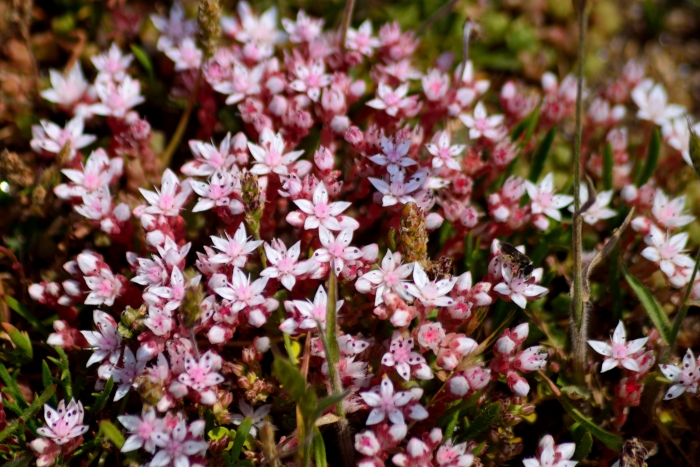English Stonecrop
(Sedum anglicum)
English Stonecrop (Sedum anglicum)
/
/

© Tom Hilton
CC BY 4.0
Image By:
© Tom Hilton
Recorded By:
Copyright:
CC BY 4.0
Copyright Notice:
Photo by: © Tom Hilton | License Type: CC BY 4.0 | License URL: http://creativecommons.org/licenses/by/4.0/ | Uploader: tomhilton | Publisher: iNaturalist |
























Estimated Native Range
Summary
Sedum anglicum, commonly known as English stonecrop, is a low-growing perennial succulent native to a variety of habitats in western Europe, including rocky outcrops, coastal cliffs, heathlands, and open grassy areas in Norway, Sweden, Ireland, Great Britain, France, Portugal, and Spain. It often occupies niches in thin, acidic soils and can be found in rock crevices, on cliffs, and on old walls, where it contributes to the biodiversity of these ecosystems. English stonecrop typically forms mats up to 5 cm tall, with fleshy, evergreen leaves that can turn pink under stress from dry conditions. The plant produces clusters of white, star-like flowers with ten stamens and five carpels during the summer months, which are attractive to pollinators such as bees and butterflies.
The succulent nature of Sedum anglicum makes it particularly suited for cultivation in rock gardens, alpine troughs, and as a ground cover in xeriscaping due to its drought tolerance. Its ability to thrive in poor soils and its low maintenance requirements make it a popular choice for green roofs and living walls. Gardeners value its year-round foliage interest and its charming white flowers that bloom from June to August. When cultivating English stonecrop, it is important to provide well-drained soil and full sun to part shade conditions. While generally pest-free, it can occasionally suffer from root rot if overwatered or planted in poorly drained soils.CC BY-SA 4.0
The succulent nature of Sedum anglicum makes it particularly suited for cultivation in rock gardens, alpine troughs, and as a ground cover in xeriscaping due to its drought tolerance. Its ability to thrive in poor soils and its low maintenance requirements make it a popular choice for green roofs and living walls. Gardeners value its year-round foliage interest and its charming white flowers that bloom from June to August. When cultivating English stonecrop, it is important to provide well-drained soil and full sun to part shade conditions. While generally pest-free, it can occasionally suffer from root rot if overwatered or planted in poorly drained soils.CC BY-SA 4.0
Plant Description
- Plant Type: Succulent
- Height: 0.1-0.25 feet
- Width: 1-3 feet
- Growth Rate: Moderate
- Flower Color: Pink
- Flowering Season: Summer
- Leaf Retention: Evergreen
Growth Requirements
- Sun: Full Sun, Part Shade
- Water: Low, Medium
- Drainage: Fast, Medium
Common Uses
Border Plant, Drought Tolerant, Fire Resistant, Groundcover, Low Maintenance, Rock Garden, Showy Flowers, Street Planting
Natural Habitat
Native to rocky outcrops, coastal cliffs, heathlands, and open grassy areas in western Europe
Other Names
Common Names: British Stonecrop
Scientific Names: , Sedum anglicum, Sedum anglicum subsp. hibernicum, Sedum anglicum subsp. hudsonianum, Sedum anglicum subsp. microphyllum, Sedum anglicum subsp. pyrenaicum, Sedum anglicum subsp. pyrenaicum, Sedum anglicum var. hibernicum, Sedum anglicum var. hudsonianum, Sedum anglicum var. microphyllum
GBIF Accepted Name: